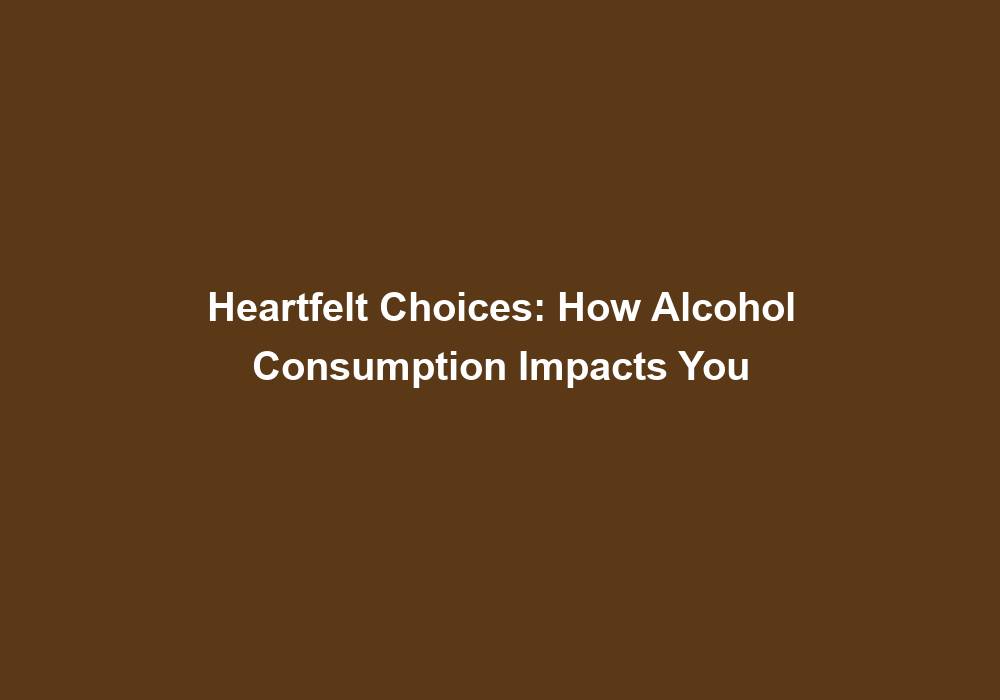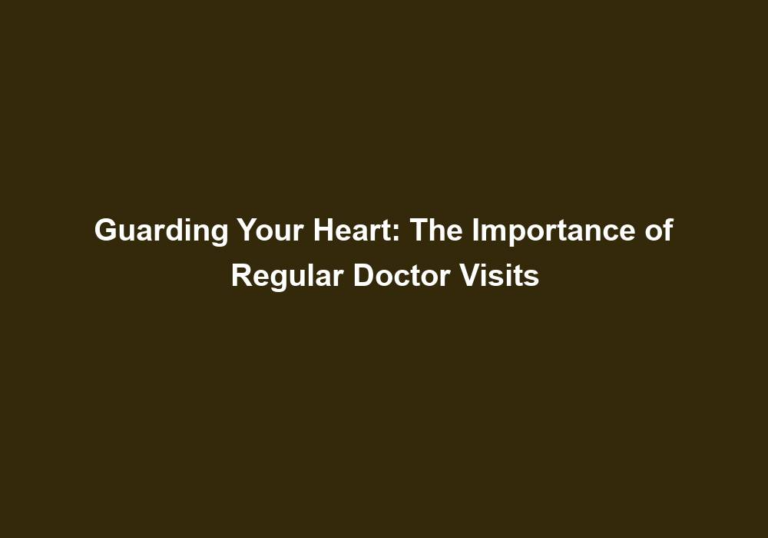Heartfelt Choices: How Alcohol Consumption Impacts You
Alcohol consumption is an increasingly important topic that has garnered significant attention in recent years due to its profound impact on individuals’ physical and mental well-being. This article aims to shed light on the various ways alcohol consumption can affect your health and provide valuable insight into making informed choices. Whether you are a casual drinker or someone considering reducing or eliminating alcohol intake, understanding the consequences is crucial for maintaining a healthy lifestyle.
The Physical Effects of Alcohol Consumption
1. Liver Damage
One of the most well-known consequences of excessive alcohol consumption is liver damage. The liver plays a vital role in metabolizing alcohol, but long-term heavy drinking can lead to severe conditions such as fatty liver, alcoholic hepatitis, and cirrhosis. Fatty liver occurs when fat accumulates in the liver cells, impairing its function. Alcohol-related hepatitis is inflammation of the liver caused by excessive drinking, which can progress to cirrhosis, a condition characterized by the replacement of healthy liver tissue with scar tissue. Cirrhosis is a serious condition that can lead to liver failure and is potentially life-threatening.
Additional Details:
- Fatty liver can be reversible if alcohol consumption is reduced or eliminated, but it can progress to more severe conditions if not addressed.
- Alcoholic hepatitis can cause symptoms such as jaundice, abdominal pain, and liver enlargement.
- Cirrhosis is a progressive disease that can lead to complications such as liver cancer, internal bleeding, and fluid accumulation in the abdomen.
2. Increased Risk of Cancer
Alcohol consumption has been strongly linked to an increased risk of various types of cancer. The ethanol in alcohol is converted into a toxic chemical called acetaldehyde, which can damage DNA and proteins, increasing the likelihood of cancer development over time. Some of the cancers associated with alcohol consumption include liver cancer, breast cancer, throat cancer, mouth cancer, and esophageal cancer.
Additional Details:
- The risk of developing cancer increases with the amount of alcohol consumed. Even moderate drinking has been associated with an increased risk of certain cancers.
- The International Agency for Research on Cancer (IARC) has classified alcohol as a Group 1 carcinogen, meaning it is a substance that is known to cause cancer in humans.
3. Heart Health
While moderate alcohol consumption may have some cardiovascular benefits, excessive or long-term heavy drinking can have detrimental effects on your heart. Alcohol can raise blood pressure, increase the risk of heart disease, stroke, and heart failure. Additionally, excessive drinking can lead to irregular heart rhythms and cardiomyopathy, a condition that weakens and enlarges the heart muscle.
Additional Details:
- Moderate alcohol consumption, defined as up to one drink per day for women and up to two drinks per day for men, has been associated with a lower risk of developing heart disease.
- However, the benefits of alcohol on heart health are outweighed by the negative effects of excessive drinking. It is important to note that non-drinkers should not start drinking for potential health benefits, as there are other healthier lifestyle choices that can provide similar benefits without the risks associated with alcohol consumption.
4. Weakened Immune System
Drinking alcohol in excess weakens the immune system, making you more susceptible to infections, viruses, and diseases. Alcohol impairs the body’s ability to fight off harmful pathogens by reducing the production of immune cells and decreasing the effectiveness of the immune response. Additionally, chronic alcohol consumption can lead to nutrient deficiencies, further compromising the immune system’s ability to function optimally.
Additional Details:
- Alcohol can disrupt the balance of gut bacteria, which play a crucial role in maintaining a healthy immune system.
- Excessive alcohol consumption can lead to conditions such as pneumonia, tuberculosis, and respiratory tract infections.
- The impaired immune function caused by alcohol can also delay wound healing and increase the risk of post-operative complications.
The Mental and Emotional Impact of Alcohol Consumption
1. Mood Disorders
Alcohol is a depressant that can initially provide temporary relief from stress and anxiety. However, excessive or prolonged usage can result in mood disorders such as depression and anxiety. Alcohol disrupts the brain’s chemical balance, affecting neurotransmitters that regulate mood and emotions. Individuals with pre-existing mental health conditions are particularly vulnerable to alcohol-induced mood disorders.
Additional Details:
- Alcohol can exacerbate symptoms of existing mood disorders or trigger new ones.
- The depressive effects of alcohol can lead to feelings of sadness, hopelessness, and low self-esteem.
- Alcohol-induced anxiety can manifest as restlessness, excessive worrying, and panic attacks.
2. Cognitive Impairment
Alcohol affects cognitive function, including memory, attention, and decision-making abilities. Prolonged heavy drinking can lead to permanent brain damage and impair cognitive abilities even when sober. Conditions such as Wernicke-Korsakoff syndrome, characterized by severe memory loss, confusion, and coordination problems, are often associated with chronic alcohol abuse.
Additional Details:
- Alcohol interferes with the communication between brain cells, leading to impaired cognitive function.
- Long-term heavy drinking can cause structural changes in the brain, affecting learning and memory processes.
- Alcohol-related memory deficits can range from mild forgetfulness to severe amnesia.
3. Addiction and Dependency
Alcohol has addictive properties, and regular or excessive consumption can lead to alcohol addiction or dependency. Alcoholism is a chronic disease characterized by an inability to control or stop drinking, despite negative consequences. It can have a devastating impact on one’s personal and professional life, relationships, and overall well-being.
Additional Details:
- Alcohol addiction is influenced by various factors, including genetic predisposition, environmental influences, and psychological factors.
- Withdrawal symptoms, such as tremors, sweating, and anxiety, can occur when attempting to quit alcohol after prolonged heavy drinking.
- Treatment options for alcohol addiction include therapy, support groups, medication, and rehabilitation programs.
Making Heartfelt Choices: Taking Control of Alcohol Consumption
Understanding the potential negative effects of alcohol consumption is the first step towards making heartfelt choices. Here are some strategies to help you take control and make informed decisions:
-
Set Limits: Establish clear boundaries and limits for yourself when it comes to alcohol consumption. This includes setting a maximum number of drinks per occasion or per week. By setting limits, you can reduce the risk of excessive drinking and its associated consequences.
-
Practice Moderation: If you choose to drink, do so in moderation. Moderate alcohol consumption is defined as up to one drink per day for women and up to two drinks per day for men. It is essential to be mindful of your alcohol intake and avoid excessive or binge drinking, which can increase the risk of developing alcohol-related health problems.
-
Seek Support: If you struggle with alcohol addiction or dependency, reach out for professional help. There are various resources available, including support groups, counseling services, and rehab facilities, that can assist you in overcoming alcohol-related challenges. Seeking support is a crucial step towards recovery and maintaining long-term sobriety.
-
Find Healthy Alternatives: Explore non-alcoholic beverages and activities that bring you joy and relaxation. Engaging in hobbies, exercising, or spending quality time with loved ones can be fulfilling alternatives to alcohol consumption. Finding healthy alternatives allows you to maintain a balanced and fulfilling lifestyle without relying on alcohol for enjoyment or stress relief.
Remember, the choices you make regarding alcohol consumption can have a profound impact on your physical and mental well-being. By educating yourself, setting boundaries, and seeking support when needed, you can make heartfelt choices that prioritize your health and happiness.
Disclaimer: This article is for informational purposes only and should not be considered medical advice. It is always recommended to consult with a healthcare professional for personalized guidance regarding alcohol consumption and its potential effects on your health.







